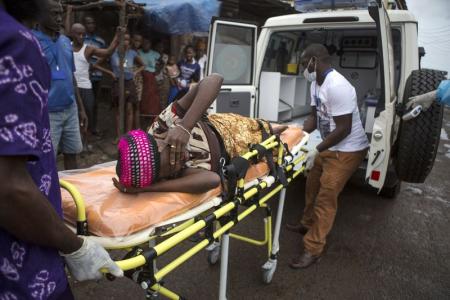LONDON, Sept 26 – By Kate Kelland, Health and Science Correspondent
(Reuters) – Deaths from infectious diseases like malaria, diarrhoea and pneumonia are likely to soar in West African countries where a vast outbreak of Ebola has crushed health systems and killed nurses and doctors.

Specialists on deadly diseases say deaths from malaria alone, which even before the Ebola crisis killed around 100,000 a year in the West Africa region as a whole, could increase four-fold in Ebola-hit countries as people miss out on life-saving treatments.
Even at this point, said Professor Chris Whitty of the London School of Hygiene and Tropical Medicine in London, in countries facing the worst of the Ebola outbreak, many more people are dying of other things that are not Ebola.
As the epidemic continues, these so-called collateral deaths — including from complications in childbirth and chronic conditions such as heart disease — will rise as the clinics and health workers that would normally treat them are overwhelmed.
Carolyn Miles, head of the international charity Save the Children, said children under five — of which there are an estimated 2.5 million living in the affected areas — are at great risk, both from Ebola and knock-on effects including the psychological stress caused by parents and relatives dying.
The health services of West Africa have to a very large degree broken down, said Jeremy Farrar, director of the Wellcome Trust international health charity. That means care of women in childbirth, of people with malaria, of people with conditions like diabetes and mental illness are all suffering.
That will have huge secondary consequences way beyond Ebola, no matter how bad this epidemic becomes.
RIPPLE EFFECT
The World Health Organisation’s (WHO) latest update says the Ebola virus has killed almost 3,000 people in the West Africa outbreak, which began early this year in Guinea and has spread to Liberia, Sierra Leone, Nigeria and Senegal.
The United Nations health agency says at least 208 health workers in the region have been killed by Ebola, from a total of 373 so far infected with the virus.
Jimmy Whitworth, the Wellcome Trust’s head of population health, said the crisis might cause malaria deaths to quadruple to around 400,000 in the coming year, with patients too afraid to come to clinics for fear of contracting Ebola, and therefore not getting anti-malarial drugs and care.
Deaths from diarrhoea and pneumonia, some of the biggest killers of children in sub-Saharan Africa, will also rise, he predicted, as will deaths of women in childbirth. Routine immunisation programmes will grind to a halt, putting children at higher risk of diphtheria, polio and tuberculosis.
The ripples from this crisis are very worrying, he told Reuters. The hospitals are full of Ebola patients and there is not space for any other type of patient, and in health clinics, there are essentially no staff any more.
Sierra Leone – one of the countries worst hit by the Ebola epidemic – even at the best of times had just about the worst maternal mortality ratios in the world, said Whitworth. We’re at a very low base, and now even that is being eroded away.
The WHO’s director-general Margaret Chan said last week her agency was acutely aware that in the three hardest-hit countries there are high numbers of deaths from causes other than Ebola.
The size of this ’emergency within the emergency’ is not precisely known, as systems for monitoring health statistics, not good to begin with, have now broken down completely, she said.
She argued, however, that these deaths should not be classed as collateral damage.
They are all part of the central problem: No fundamental public health infrastructures were in place, and this is what allowed the virus to spiral out of control.





